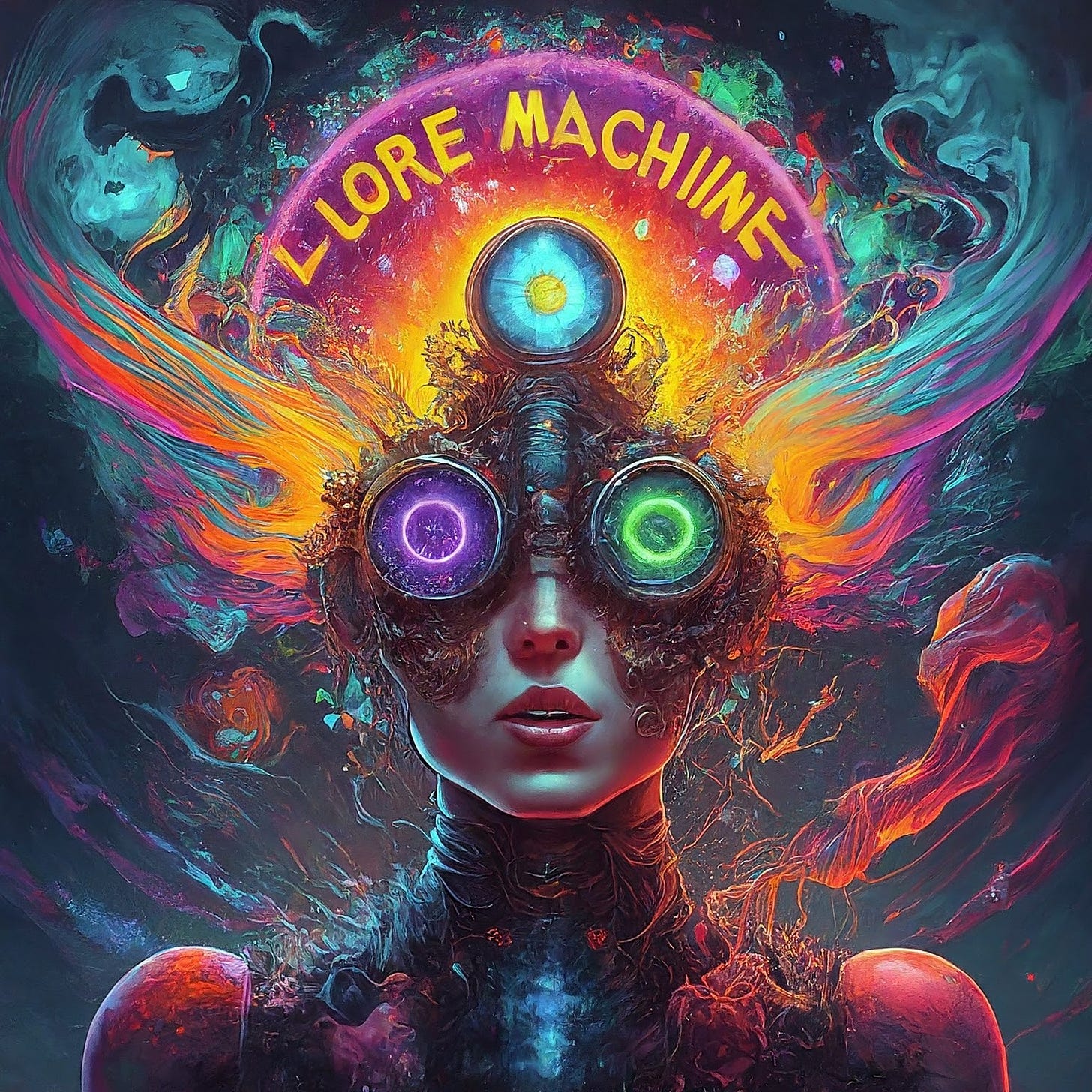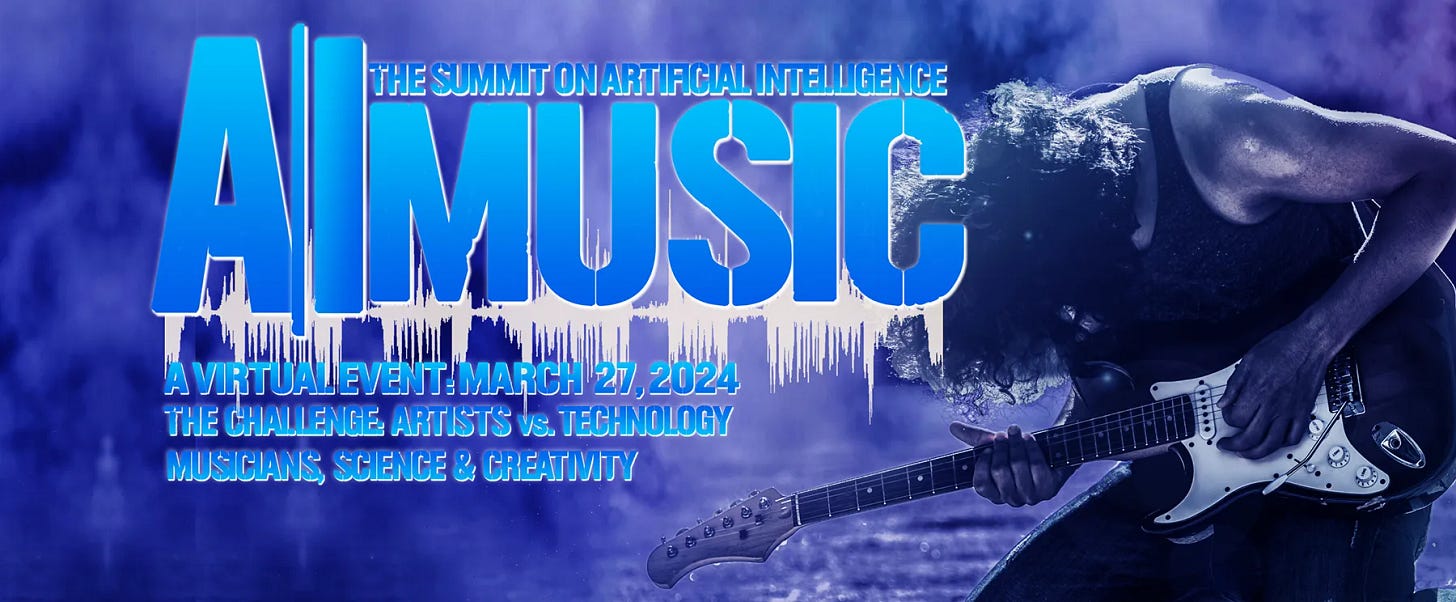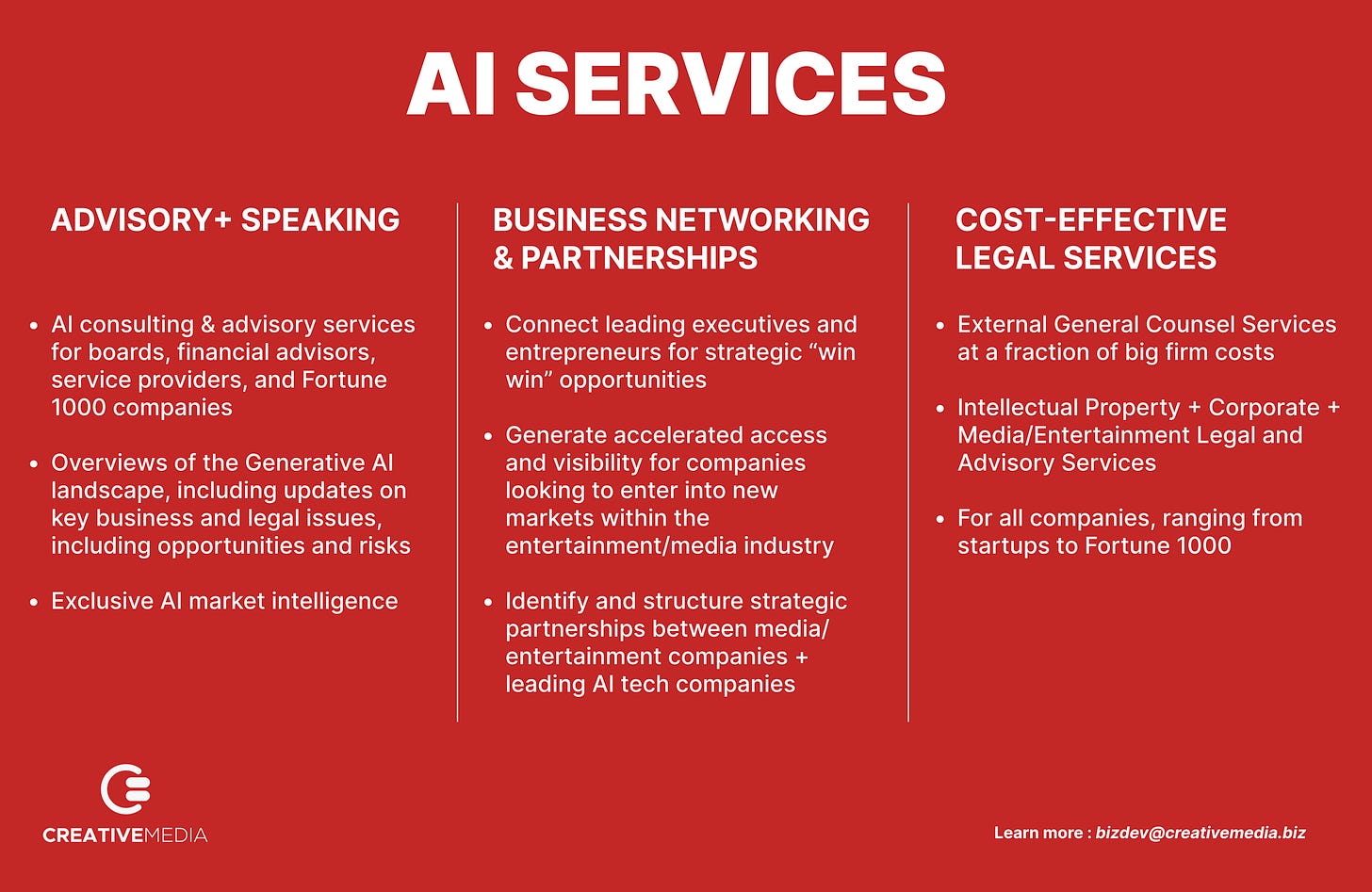Prepare to have your mind blown! (watch this video to see how generative AI will upend Hollywood & Madison Avenue)
Lore Machine's latest development is a sign of things to come. So be prepared!

Happy Monday. Time for your latest AI media and entertainment brAIn dump! As always, this is how we do things. First, “the trAIler” - the 10 key media-related AI headlines from last week (the “AI:10”). Next, “the mAIn event” - this week features a “must watch” video that likely will blow your mind about how generative AI will upend video creation (watch it, trust me). Then, “the cocktAIl” - my AI mixology that features a link to register for my exclusive March 27th Digital Hollywood virtual AI roundtable session with Stewart Copeland of The Police. Finally, “the AI legal case tracker” - updates on the key generative AI-focused copyright infringement cases.
I. the trAIler - 10 “quick hit” AI headlines from last week
(1) The EU leads the way again, this time approving the world’s first AI regulations. Among other things, the regulations establish meaningful guardrails that impact the creative community, requiring labels for AI-generated images, video or audio content. So will the U.S. soon follow suit? Read more about it here in Forbes.
(2) And it’s not just about labeling AI generated content. How about compensating artists when their copyrighted works are used to “train” AI? But don’t forget privacy issues impacted by generative AI. That’s a massive issue too. Read more about “Generative AI’s privacy problem” in Axios. On that note, a federal judge in California just applauded lawyers in a privacy class action for their “very awesome” use of Google’s own AI tool to argue that Google Analytics illegally scoops personal data from websites. Read about that here.
(3) SXSW Stories - a tale of two generative AI Hollywood stories last week in Austin. The audience cheered for directors of the Oscar winning film “Everything Everywhere All At Once” when they sounded alarm bells for unbridled AI development (and its impact on creatives). Meanwhile, on the other side of the room, audiences jeered OpenAI’s VP of consumer products and head of ChatGPT Peter Deng when he refused to answer the question whether creators should be compensated when their copyrighted works are used for generative AI training.
(4) Who says Apple doesn’t do M&A? It does when it’s fallen behind on generative AI. Tim Cook’s crew just scooped up another AI startup. Read more here from TechCrunch. Meanwhile, the rest of Big Tech - the mega players behind the gen AI leaders - are quietly tamping down expectations (at least for the short term). Read more in The Information.
(5) Oh Elon! After suing OpenAI earlier this month for violating its fundamental mission to “do good,” Musk told the world that he is releasing his “truth-seeking” chatbot Grok (his version of ChatGPT) for free to all of us to download and use. Is he doing this to do good? Or is this just more Musk sour grapes - and is he, in fact, making the world more dangerous by giving everyone the most powerful AI tools? Read more here from WIRED. Oh yes, he also said that AI will become smarter than humans by 2029.
(6) Cuebric is a “must know” generative AI company bullishly playing in the world of Hollywood pre-visualization. The company just unveiled a new three-tiered pricing structure. Worth knowing and checking out via this link.
(7) For those of you not so bullish about generative AI’s impact on Hollywood, this one’s for you. Read “For Voice Actors, the Race Against AI Has Already Begun” via TheWrap. And just when you thought notorious P2P piracy site Limewire was finished (2 decades ago!), it’s baaaack! It now apparently wants to be a generative AI powerhouse. You can only imagine its position on using copyrighted works to “train.” Here’s a recent propaganda piece.
(8) Meanwhile AI research academics like “godmother of artificial intelligence” Fei-Fei Li of Stanford are sounding the alarm. They worry that the best AI minds are moving to Big Tech - and that the Feds need to do something about it to ensure independent study of generative AI (and place some kind of “controls” over otherwise guardrail-less Big Tech. She has a point! Read more from The Washington Post.
(9) The East-West generative AI divide. New data from Axios shows that workers in Asia are embracing AI tools for productivity significantly more than workers in Western countries. 67% of workers in India believe that AI improves productivity, whereas only 17% do in the U.S. If that’s the case, how does Hollywood feel about AI?
(10) This week’s mind-bender. If your goal is to get to artificial general intelligence (AGI) (a scary thought, indeed), then this company argues that current generative AI models will never get us there. Verses says its very different “distributed intelligence” approach is the key. So are you along for the ride? Read more about it here.
II. the mAIn event - Lore Machine’s “must watch” video that shows you how generative AI transforms (and upends) video creation (and potentially Hollywood itself)
You’ve all heard about “Sora” - OpenAI’s new text-to-video generator. As I wrote a couple weeks ago, its unveiling served as a Hollywood wake-up call (check out various video demos here). But Sora isn’t publicly available yet - and it’s limited to one minute in terms of output. On the other hand, LA-based entertainment-focused generative AI company Lore Machine is. And unlike Sora or anything else like it, its “Storytelling Visualization System” allows users to upload and visualize full scripts and other material up to 30,000 words.
The results are game-changing, mind-blowing, and all adjectives in between (and I see a lot of things). Watch this video below (also available via this link) - and then consider that we’re just 15 months since OpenAI unleashed ChatGPT into the world.
Now that you’ve watched it, I can see the wheels turning in your head. You’re asking yourself, “What does it mean for my art? My job?” Great questions!
I interviewed Founder Thobey Campion about it all. I’ve closely tracked Lore Machine for over a year (here’s my profile in TheWrap one year ago). Its target market is both entertainment storytelling and Madison Avenue advertising. Campion spent years at Vice Media (the good years!) and is one of the smartest execs I’ve met in this generative AI space. So unlike the tech bros behind OpenAI and Sora, Thobey’s DNA is creative through and through. He’s deeply thoughtful about the issues that face the creative community.
Thobey tells me that Lore Machine will soon launch “a range of export form factors, including image-to-animation, an instant film format, an image-in-text format that drops images into stories, an audio scraper, and an instant comic book format.” So I asked whether high quality feature films will be possible with just text inputs and generative AI. And - brace yourself! - Thobey tells me that, yes, “if we’re talking the first entirely synthetic film, we’re less than a year away.” But he also says, “It’s my hope we don’t go full synthetic. It’s my hope that we humans find a mutual symbiosis with these new generative AI tools.”
If this is the creative community’s new reality, what role will humans play in the future of filmmaking and Madison Avenue style advertising? Thobey tells me this: “If every tool you need to make a film lies inside a GPU connected to a PC that sits on someone’s desk, then the future of filmmaking is owned by writers, the originators of story. Writers will go from side show to main event overnight and become the gods of entertainment they deserve to be. We built Lore Machine to expedite this future. Same goes with the ad world. This doesn’t mean that other roles go away. The folks that will take these tools to the next level will have experience in art history, cinematography, lighting and everything else creative that goes into a film. They can just move at sonic speed now.” Most importantly, he says, those with “taste” will stand out.
I reflected on Thobey’s words. No matter what, generative AI’s impact on the creative community is real (and likely transformational). One small example is right here in my newsletter. I created the headline graphic using Google’s free Gemini chatbot. That means I didn’t need to hire a graphic artist or pay for stock art from a Getty Images type service. That’s market substitution and artist impact in action.
So what do we, in the creative community (filmmakers, musicians, artists, and those who support and finance them), do to prepare ourselves for this potentiality? As I wrote last week, shock and awe certainly isn’t the answer. Positivity and proactivity is. I suggest you revisit my “6 steps for success in an increasingly generative AI media and entertainment world” article from last week.
I also believe that human creativity, originality and relationships never get old. I wrote about this previously in this piece titled, “My Son Is Going to NYU Film School - What’s the Point in an AI World” (you can check it out via this link). Thobey agrees. This is what he tells me: “Generative AI will never be able to write a truly original screenplay, never be able to catch viewers off-guard with a surprise angle, never be able to capture the essence of the human soul that is the key ingredient in good storytelling.” But, he says, “AI sure as shit will help though.”
[Speaking of that great son of mine (now a junior at NYU Tisch), click on this link to watch his recent dystopian AI-inspired short film “Terms and Conditions.” You may like it. And if you do, share it. Remember, humans support each other, right?]
What do you think? Send me your feedback and reach out to me at peter@creativemedia.biz.
III. the cocktAIl- your AI mix of “must attend” AI events
After all, it’s always happy hour somewhere!
(1) Register for Digital Hollywood’s free March 27th “AI & Music” virtual roundtable where I interview Stewart Copeland of THE POLICE and Alex Ebert of EDWARD SHARPE!
I am proud to partner with Digital Hollywood to bring you a series of monthly virtual roundtable discussions leading up to their first ever “AI Summit” event this July (more info below). In this first roundtable on March 27th, I interview multiple Grammy winning artist Stewart Copeland (drummer of legendary band The Police) and Alex Ebert (multi Platinum recording artist of Edward Sharpe and Golden Globe winning composer) about how they feel about generative AI and how it will impact their art and their livelihoods. It’s a session all about generative AI & music.
(2) Check out Digital Hollywood’s first generative AI-focused virtual summit, “The Digital Hollywood AI Summer Summit,” on four days in July (July 22nd - 25th). The sessions are outstanding. Learn more here via this link.
(3) AI LA’s “A.I. on the Lot” on May 16th, 2024 is a “must attend” event. Check it out and sign up here. I attended last year. It’s where all the LA-based media and generative AI “movers and shakers” meet, learn, and collaborate. You gotta be there.
Reach out to me at peter@creativemedia.biz with your feedback & submissions. I may feature them.
check out my firm Creative Media and our AI-focused services
IV. the AI legal case tracker - updates on key AI litigation
Rather than lay out the facts of each case - and the latest developments - here in every newsletter, click on this “AI case tracker” tab on “the brAIn” website. You’ll get all the up-to-date information you need. These are the cases I track.
(1) The New York Times v. Microsoft & OpenAI
(2) Sarah Silverman, et al. v. Meta
(3) Sarah Silverman v. OpenAI
(4) Universal Music Group, et al. v. Anthropic
(5) Getty Images v. Stability AI and Midjourney








What was it trained on? It looks like Stable Diffusion?